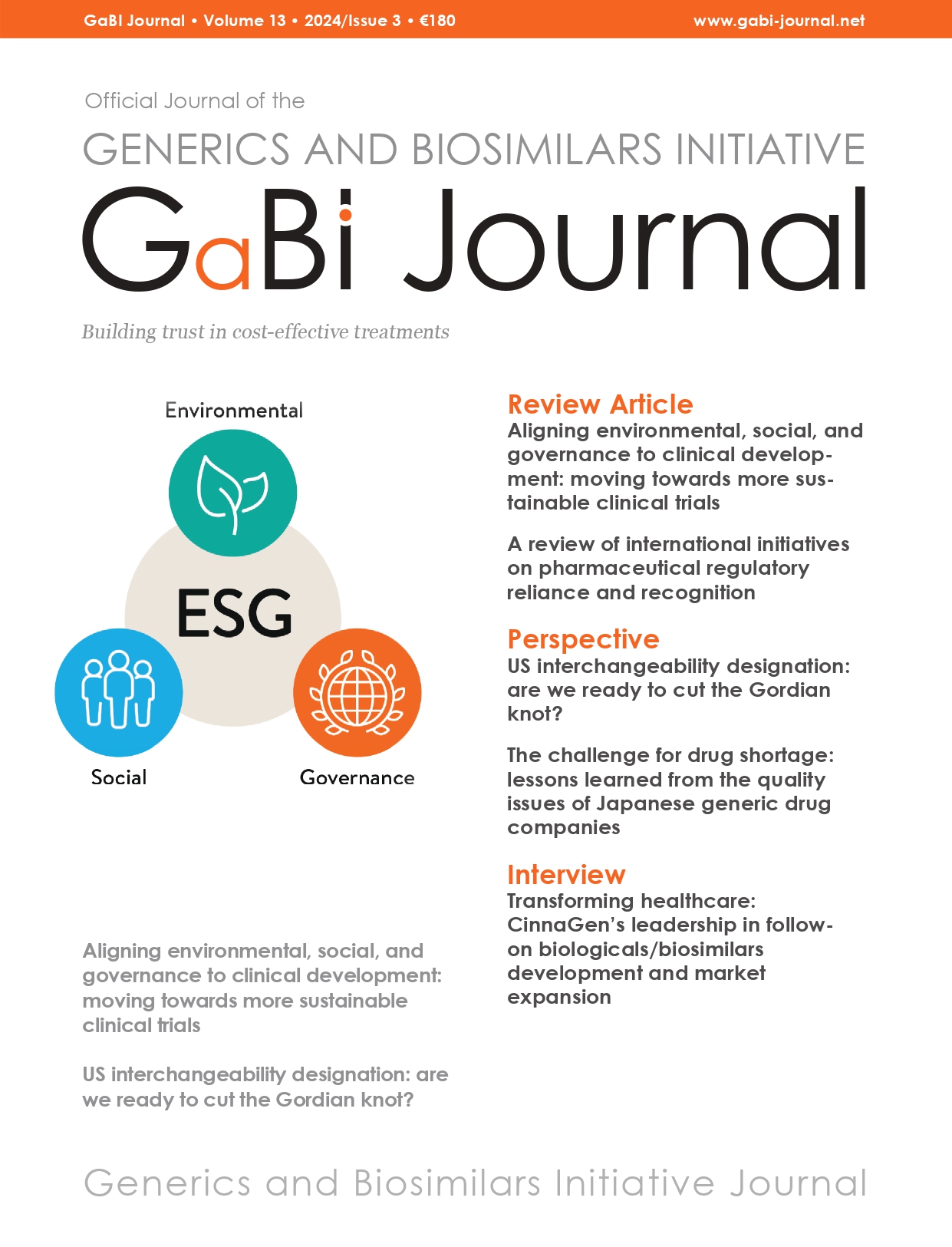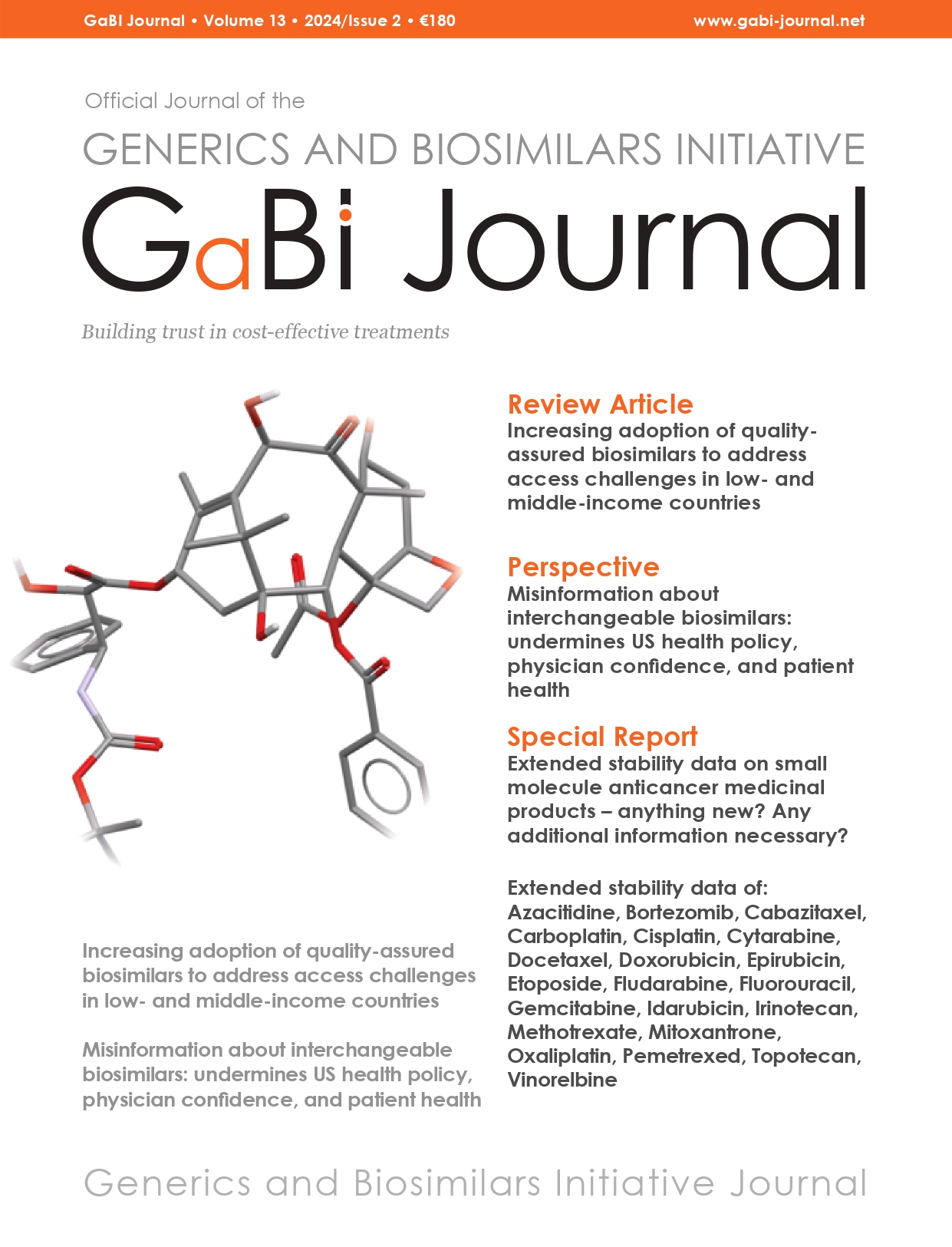Generic medicine pricing: on track in Europe?
Published on 2012/02/14
Generics and Biosimilars Initiative Journal (GaBI Journal). 2012;1(1):5.
| Abstract: There are many variables responsible for the pricing of generic medicines in Europe. This editorial looks at the many policy initiatives currently being undertaken. |
Submitted: 3 November 2011; Revised manuscript received: 23 November 2011; Accepted: 14 December 2011
In this first issue of the Generics and Biosimilars Initiative Journal, Professor Steven Simoens describes the pricing of generic medicines in ambulatory care in Europe for the period 2000–11, pages 8 to 12. The author makes a number of interesting observations, a few of which will be discussed here.
First, Professor Simoens observed that both the prices and market shares of generics vary substantially across European countries. In an attempt to explain these differences he stresses the importance of price regulation imposed by the government versus free-market pricing, where the penetration of generics is higher in the case of free pricing. This is because, in countries with free pricing, the manufacturers of originator medicines can charge premium prices, thereby attracting the market entry of generic medicines. Manufacturers of generics are thus able to raise their market share by offering price reductions.
This observation of Professor Simoens might be true in many cases, but the probability of other entry barriers to enter the market should not be underestimated. Other such barriers include the registration of multiple patents on drugs (even on the route of administration), biased marketing, financial offers by originator companies to buy-off potential generic producers and cartels of existing generic producers might frustrate or slow down market entry of new generic producers and hence limit the price reduction.
Professor Simoens cited a market survey from 2011 that states that 80% of European countries impose price regulation and 20% adhere to free-market pricing. Many price regulating countries have established a fixed minimum price difference between generic and originator medicines and this approach has the benefit of guaranteeing savings to the third-party payer. However, these savings might be less than what could have been observed in a competitive market. This opinion was also shared by Dr Andreas Seiter of the World Bank in a keynote presentation at the Pharmaceutical Pricing and Reimbursement Information Conference in 2011 in Vienna, Austria [1].
The potentially larger savings of a competitive market can only materialise when such a market truly exists. As long as governments do not have the power to model the market institutions towards increased competition, they might prefer a more certain, but lower amount of savings as a result of regulation, as governments are assumed to be risk averse.
In addition, recent examples of Portugal and Ireland, both of which apply price regulation, show that the Euro crisis created a sense of urgency. Under Troika pressure, both governments achieved a considerable reduction in the pricing of generics. Ireland also reduced the wholesale and retail mark-ups and dispensing fees and Portugal lowered the reimbursement value of generics to the value of the cheapest five generics. In addition, the market share of generic medicine was seen to increase substantially in Portugal during 2006–11 [2, 3].
Professor Simoens also discusses tendering, that is, a purchaser buys medicines based on a competitive bidding process and the contract is granted to the supplier who offers the best bid. He states that although tendering systems may reduce (generic) medicine prices in the short term, little is known about the overall long-term impact. Although I agree with this cautious statement, medium term results for The Netherlands make me more optimistic. If the preferential policy of Dutch health insurers can be viewed as tendering, we can conclude that it resulted in a 60% structural price reduction of preferential generics (90% of all generics) since 2008. The market share of generics in The Netherlands increased to 59% of prescriptions in 2010. The savings on drug costs due to the preferential policy were estimated to be Euros 300 million for 2008 and Euros 500 million for 2010 [4].
In conclusion, many policy initiatives are currently being undertaken to reduce prices of generic medicine to affordable levels. Although free-market pricing based on competition might be preferable from an economic point of view, this might be limited by institutional and/or political barriers. The euro crisis clearly has increased the sense of urgency to undertake drastic policy steps in several countries.
References
1. Seiter A. The World Bank. Balancing pharmaceutical policies between equity and cost-containment –a critical discussion and lessons learned. Pharmaceutical pricing and reimbursement – a global perspective. PPRI Conference 2011; 2011 Sep 30; Vienna, Austria. Available from: http://whocc.goeg.at/Downloads/Conference2011/PraesentationenPPRIKonferenz/Day2_afternoon_Festsaal_1400_Seiter.pdf
2. Mulvenna K. P & R in the light of the financial crisis: Ireland. Pharmaceutical pricing and reimbursement– a global perspective. PPRI Conference 2011; 2011 Sep 30; Vienna, Austria. Available from: http://whocc.goeg.at/Downloads/Conference2011/PraesentationenPPRIKonferenz/Day1_afternoon_Festsaal_1300_Mulvenna.pdf
3. Gomes MV. Medicine Policy: surviving the crisis. Pharmaceutical pricing and reimbursement – a global perspective. PPRI Conference 2011; 2011 Sep 30; Vienna, Austria. Available from: http://whocc.goeg.at/Downloads/Conference2011/PraesentationenPPRIKonferenz/Day1_afternoon_Festsaal_1300_Gomes.pdf
4. College voor zorgverzekeringen (CVZ) [homepage on the Internet]. [cited 2011 Dec 11]. GIPeilingen 2010, Diemen 2011.
|
Author: Associate Professor Marc A Koopmanschap, PhD, Health Economist, Associate Professor of Health Economics, Institute of Health Policy and Management and Institute for Medical Technology Assessment, Erasmus University Rotterdam, PO Box 1738, NL-3000 DR Rotterdam, The Netherlands |
Disclosure of Conflict of Interest Statement is available upon request.
Permission granted to reproduce for personal and non-commercial use only. All other reproduction, copy or reprinting of all or part of any ‘Content’ found on this website is strictly prohibited without the prior consent of the publisher. Contact the publisher to obtain permission before redistributing.


